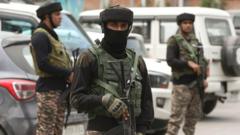**Efforts toward normalization reveal cautious optimism as a cease-fire holds amidst a turbulent regional backdrop.**
**India and Pakistan Engage in Soldier Swap as Truce Persists**

**India and Pakistan Engage in Soldier Swap as Truce Persists**
**The exchange underscores a fragile peace amid escalating tensions and past conflicts.**
In a significant development, India and Pakistan facilitated a soldier exchange on Wednesday, signaling the ongoing stability of the cease-fire that recently ended intense hostilities between the two nuclear nations. The swap occurred at the Attari-Wagah border, the principal crossing point between India and Pakistan, marking a hopeful step towards reducing tensions.
The Indian Border Security Force confirmed that a border guard, who had been held in Pakistani custody for weeks, was returned after three weeks, while a Pakistani Rangers member was handed over in exchange. Both soldiers had crossed into each other's territories unintentionally before a series of military skirmishes ignited last week, following an Indian airstrike in response to a deadly terrorist attack in Kashmir, which India attributes to Pakistan's involvement—a claim that Pakistan denies.
The recent military conflict, marked by four days of intense engagement, has not been witnessed in decades, prompting international attention and intervention. A cease-fire agreement, facilitated by the United States, was reached on Saturday, allowing for a tentative return to normalcy in the region—evidenced by the resumption of commercial flights and efforts to assist Kashmiris in rebuilding.
As the dust begins to settle, both nations cautiously navigate the delicate path toward peace while remaining vigilant about potential provocations that could unravel the fragile agreement.
The Indian Border Security Force confirmed that a border guard, who had been held in Pakistani custody for weeks, was returned after three weeks, while a Pakistani Rangers member was handed over in exchange. Both soldiers had crossed into each other's territories unintentionally before a series of military skirmishes ignited last week, following an Indian airstrike in response to a deadly terrorist attack in Kashmir, which India attributes to Pakistan's involvement—a claim that Pakistan denies.
The recent military conflict, marked by four days of intense engagement, has not been witnessed in decades, prompting international attention and intervention. A cease-fire agreement, facilitated by the United States, was reached on Saturday, allowing for a tentative return to normalcy in the region—evidenced by the resumption of commercial flights and efforts to assist Kashmiris in rebuilding.
As the dust begins to settle, both nations cautiously navigate the delicate path toward peace while remaining vigilant about potential provocations that could unravel the fragile agreement.























